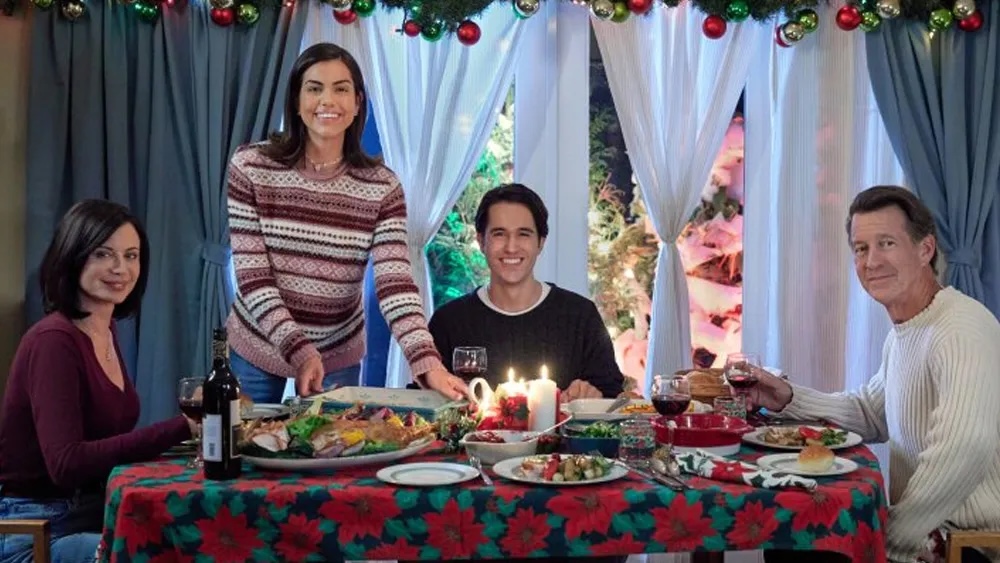Rick Garman moved to Los Angeles at the age of eighteen to be an actor. “I got out as soon as I was sure my parents couldn’t send a sheriff to bring me back,” he jokes. “I went to acting school, worked a bunch of jobs, and landed at a theater company called The Colony Theater.”
“One of our cast members had just passed away from AIDS. They wanted to do a play about [the subject], but our audience was very conservative and there was nothing else out there. I sat down and said, ‘I’ve been in plays, I’ve seen plays, I can write a play,’ so I wrote a play.”
The production won some awards and got performed around the country. “Writing became my passion. I wrote all the time even though I wasn’t getting paid for it.” This led to some spec scripts and pilots as Garman climbed the corporate ladder in the tech world.
“It was about finding the characters and the heart, which has become my hallmark for lack of a better word,” he said of this ability to walk the line of tough subjects but appease all audiences. “It was less about the issues and more about the people. The way big events affect people on a personal level.”
“One of my favorite themes in writing is that people are walking around in their everyday life, thinking the world is one thing, and then something happens and their world shifts. The rug gets pulled out from under them and they have to look at life and the world around them in a very different way.”
He eventually sold a TV movie script to a channel called Pixel, which led to four more scripts, and then an opportunity to write for Hallmark. “In 2017, I quit my high-paying executive job in the internet world (places like Disney and Yahoo) and became a writer full time. I’ve written about forty movies in the last seven years.”

Rick Garman. Photo by Heather Shiver
In 2022 alone, Garman has credits for Groundswell, Christmas at the Drive-In, and A Christmas… Present. This year, he’s got credits for Notes of Autumn and the new film, Christmas on Cherry Lane.
Writing for Actors
“Having gone through acting training and done a lot of plays, I have a lot of experiences where I had to say things that aren’t the way people talk. People rarely talk in complete sentences with punctuation at the end. They’re run-ons and they go in different directions.”
What Garman does that is different is that he reads all of his first drafts out loud. “It helps me with the writing process. It’s not a guarantee that it comes out of my mouth okay it will then come out of the actor’s mouth okay, but there are times when I read a line I’ve written and think, nobody talks like that.”
“My dialogue is very conversational. I use ellipses all the time in my dialogue. ‘Well It’s just that…’ or ‘what I really mean is…’ and it’s just the way people talk. I’ve gotten a lot of feedback from actors that the dialogue is easier for them to say than a lot of other scripts they’ve had.”
That said, the very specific genre of a Hallmark Christmas or television movie means it’s a lower budget and must be filmed quickly, so while it’s meant to be conversational, it’s also not meant to be overwhelming to slow down production.
“As long as they’re getting the framework, they can put their own creativity and artistry on top of that. I’m not a writer who feels precious about his words. I’ve written in a way that is natural and easy to say, but if the actor has a different choice for the dialogue and intention, that’s their creativity to make it better.”
Garman says the same for his stage work. “If you think of something better, more funny, then do it. I’m happy to be rewritten.”
Rules of Hallmark Christmas
One major rule for any Hallmark Christmas movie is to have Christmas in every scene. If you’ve ever seen one of these movies, you’ll notice everyone’s outfit and every room is decorated in a way that each shot can have that feeling of Christmas.
“I don’t know if it’s a rule, but certainly in a Christmas movie, there’s no such thing as too much Christmas, not just for Hallmark. The characters, generally speaking, need to be talking about Christmas or doing something Christmas-y. If it’s a getting to know you scene, they need to be doing so while wrapping presents or decorating a tree.”
“If they’re at a restaurant then that can be them talking about Christmas, but Christmas is interwoven through the whole thing. You have to have a lot of that. Then there are general screenwriting rules that apply to everything. Escalations in Act 3, basic storytelling structure.”
Hallmark and Great American Family audiences are looking for a specific tone. “It’s the world where nobody dies. The bad guys aren’t really all that bad, just misguided and they see the errors of their way by the end of the movie. It usually ends with a kiss. It’s comfort food so you’re not going to have crime or anything to take people out of that holiday spirit or romance.”
The latest film, Christmas on Cherry Lane, was meant to be a little more complex. “I wanted to do a story with complexity to it, so this one has three different stories of families that live on Cherry Lane, and as the movie unfolds, you start to understand how these stories are connected to one another. It unfolds in sort of a This is Us sort of style. It’s not one hundred percent linear. We sort of bounce around.”
New Writing Challenges
“As a writer, it was a really interesting challenge to set up all of this stuff and figure out how to make the reveals and do the twists and turns without giving anything away, but still make it a very satisfying story with interesting characters, lots of heart, and lots of Christmas.”
To achieve this goal, it required a lot of “outlining” and “bullet points.” Garman adds, “I basically wrote an outline for each of the stories and had the idea of what each story was and how they were connected, but as I wrote each of the individual stories, I was able to go back and find even deeper connections, how they overlap, and how to break them apart.”

John Hamilton (John Brotherton) & Lizzie (Erin Cahill) Photo courtesy of Hallmark Channel
“I do it all on paper. I’m not big on note cards or organizational screenwriting programs. I’m more of a Word guy,” he jokes. “I got a lot of feedback from the people involved that it was surprisingly clear if that makes sense. In reading the script, everybody had the satisfaction of the reveals and there wasn’t any or very little, ‘Wait a minute, who is this?’ and a lot of that is because I took the time and I do obsessively detailed outlines.”
The Decision to Write
Thinking back on those forty scripts in seven years, Garman says, “I turned fifty in 2016 and I knew if I didn’t do it then I was never going to do it. I had wanted to do it for 25 – 30 years. It was a terrifying decision, but things I had gone through in my line – cancer in 2012 – it changed my worldview much like that theme that I like. It made me look at the world in a different way. I realized I had spent too much of my life worrying about steady jobs, a paycheck, and I missed a lot of opportunities because of that. I realized I wasn’t going to do that anymore.”
“How that translates to someone who hasn’t finished their first screenplay, it’s about not stopping. If it’s something you’re passionate about, I wrote for twenty years not getting paid for it because it was therapy for me. It allowed me to have a deep shelf, those things you write and put in the drawer. Still today, people come to me and say we want to do a talking dog movie and I’ve got scripts for that.”
As a final bit of advice, the screenwriter says another reason for his delay was that he was bad at “being an advocate” for himself. “There’s a reason that a lot of writers sit behind the computer screen and make other people talk,” he jokes. “Having a strong advocate who has a sense of the business world is critical, but the other side is understanding the business of moviemaking, which has different structures in the different worlds you’re working in.”
This is also Garman’s advice for anyone trying to break in today. “The competition to write these things is fierce. The people who make these movies, much like the rest of the industry, it’s not like you can call them up and pitch an idea.”
“But if you have a manager or an agent or a connection, it makes getting down those pathways easier. It’s really rough doing it yourself. It’s not like getting an Indie movie made, it doesn’t work that way.”
This interview has been condensed. Listen to the full audio version here.

